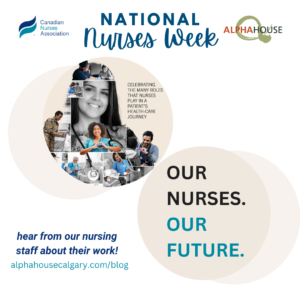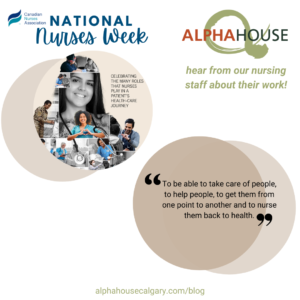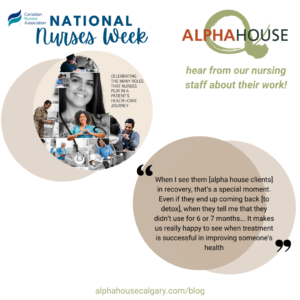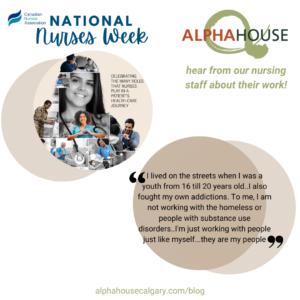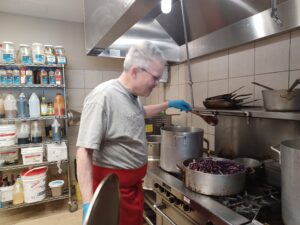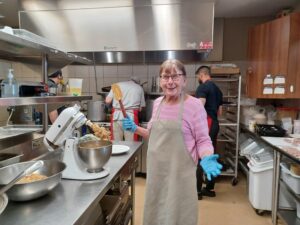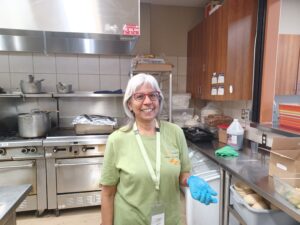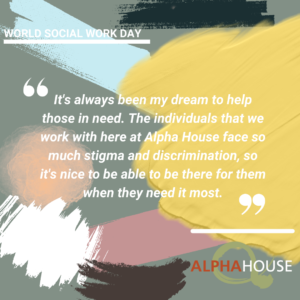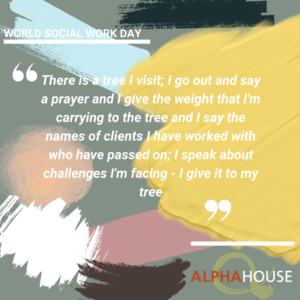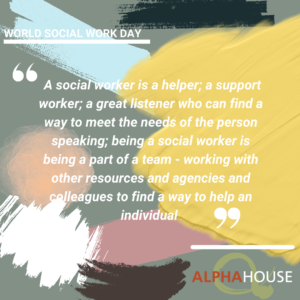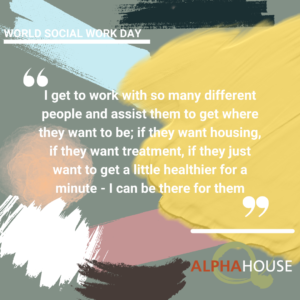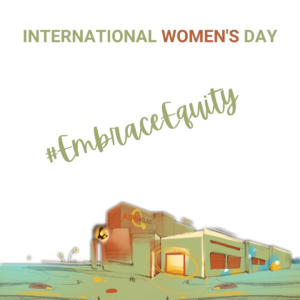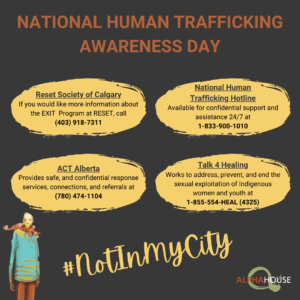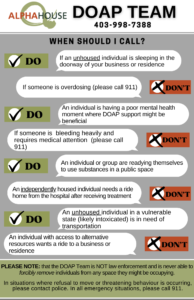Remember that time….
Shaundra Bruvall | June 20, 2023
Looking back 10 years later on the 2013 floods
I’m sitting in a boardroom at Alpha House’s Community Housing and Administration building with 3 longtime Alpha Staff. Each of them was a big part of Alpha House’s initial (and ongoing) response to the flooding that washed away most of Calgary’s downtown in June of 2013. I sat down to hear from them about their experiences and recollections on this 10-year anniversary. We hope you enjoy stepping back in time with us to June 2013 in Calgary, AB and journeying with us through some of the challenges and memories from that crazy 6 months when Calgary was temporarily transformed and the real spirit of community was shown.
2013. JUNE. CALGARY, ALBERTA
Alpha House has been in operation for over 30 years but, for the most part, we fly under the radar. We work with a subset of the homeless population through our Shelter, Detox, Housing, and Outreach programs but….things aren’t quite the same in 2013 as they are today. We’re a staff of only 40 (now over 300) with 1 DOAP Team (now 5 teams rebranded to ‘HELP’ and 3 other outreach programs), and only 2 housing buildings (now 7).
Our Shelter still housed 120 beds in June of 2013 as it does today but it was only about 50% full when a Fire Marshall showed up at Alpha House Society on a beautiful, sunny, now infamous day around 5PM to deliver some bad news.
ENTER JADE W, then Shelter Team Lead, who was the one on-site that day to receive the ominous news:
“You need to evacuate your building.”
To which, Jade, said, politely, incredulously…. “To where?”
Well… the ‘where’ would be a somewhat unknown answer for several days and, as it turns out, weeks over the course of the summer of 2013.

THURSDAY. 20 JUNE 2023. 1700 HOURS. CALGARY ALPHA HOUSE SOCIETY
Take me back to that first moment when the Fire Marshall showed up and told you to evacuate – what were you thinking? What happened? When did you realize this was going to be significant for Alpha House and its clients?
“Well, I didn’t think it was going to be. It was a beautiful sunny day, there wasn’t any visible signs it was going to be a long-term thing. I was Team Lead in the Shelter then and, I remember, there was some disagreement about whether we were going to evacuate. The Fire Marshall is telling me we have to leave and I’ve got one of our Managers behind him saying ‘No, we don’t.’ And I’m trying to figure out a possible evacuation and kind of freaking out and when I asked the Fire Marshall where we were supposed to go, he said ‘you need to go home’ and I remember saying ‘they have nowhere to go; this is their home.’
“This is their home”
THURSDAY. 20 JUNE 2023. 1800 HOURS. CALGARY ALPHA HOUSE SOCIETY
Calgary Police Services reports to Alpha House to inform staff there would be a bus arriving in 15 minutes to take everyone to the Calgary Drop-In Centre.
“I was supposed to be off at 6PM,” Jade shares, “but I was there till about 9PM and the new team had come on and we’re trying to get everyone on the bus.”
What was the plan? You said you weren’t thinking long-term but were there any plans put in place?
“Well-no,” Jade says, truthfully. “There were mats still on the floor – we left everything because we didn’t know. We thought we would be back. We were still trying to come up with a game plan because we really didn’t know where we were going or for how long. The one really good thing we did do was empty our parkade of our DOAP vans – which ended up being probably the best thing we did that night.”
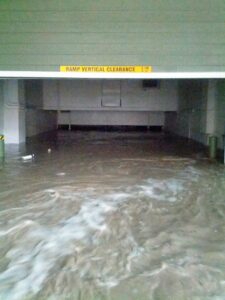
Kathy C, then (and current) Executive Director of Alpha House, remembers being one of the last people in the building.
“I remember standing in the Shelter – and that was one of the only times the building has ever been empty – and I kept going out on to the street and just standing there, looking left and right…and just…looking..”
“It was so nice out still.”
“No one knew what was coming.”
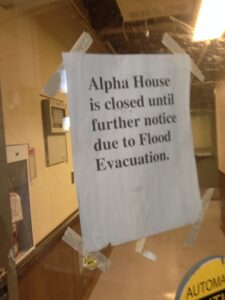
THURSDAY. 20 JUNE 2023. 2200 HOURS. CALGARY DROP-IN CENTRE
Heavy rainfall on the melting snowpack in the Rocky Mountains combined with steep, rocky terrain caused rapid and intense flooding in southern-Alberta watersheds. The City of Calgary transformed virtually overnight.
Another evacuation happened at the Drop-In Centre overnight as their East Village location was also impacted. The Drop-In Centre had another building off McKnight where they evacuated their people.
Alpha House staff and clients were not evacuated with them. “We didn’t know where we were going to go then,” said Jade.
FRIDAY. 21 JUNE 2023. 0200 HOURS. CALGARY, AB.
As the waters rushed towards Calgary, The City issued a flood warning, activated the Municipal Emergency Plan, declared a state of local emergency and gave an evacuation notice for communities at risk.
Alpha House, to this day, serves an incredibly vulnerable community – those who are continually at risk because they are without housing. In a parallel with the COVID-19 pandemic that would shut down the City of Calgary in a different way 7 years later, the 2013 flood would affect those who did not have access to safe housing (outside of the flood zone) most.
The city basically split down the river – if you were on one side, you could access things on your side of the river. “I remember,” says Karen S, Team Lead at one of Alpha House’s 2 housing buildings at the time, Francis Manor, “the five of us [team leads/managers] were on a conference call/ group chat all night because we weren’t sure when we needed to go – when we were going to be needed or where or how. I called Nicole (then Shelter Manager) and said ‘I’m going’ – and she said ‘how? You can’t’ – and I just said ‘I’ll get there.’
“It was a feeling of ‘we’re going to get it done’ –whatever needs to get done”
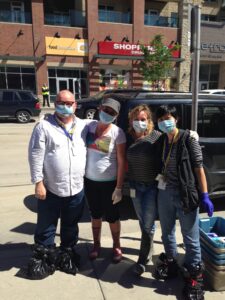
FRIDAY. 21 JUNE 2023. 0700 HOURS. CALGARY, AB.
There were a number of spaces setup for people who had been displaced. One of those was Central Memorial High School.
Jade started her day at Francis Manor. “This was before we had staff cell phones so we were using our personal phones and trying to figure out what to do for our clients as we had no building. The DOAP team were packing vans and taking clients to where we were told to go at that time [central memorial HS].”
ENTER MARIANNE, then Shelter Team Lead. “I’m at home and I get a call from Nicole – she said ‘do you think you can get to Central Memorial High School.’ I wasn’t really even aware of what was happening in the neighbourhood because where I lived was unaffected. But I grabbed my backpack and my skateboard (cause I wasn’t sure how far I was going to be able to drive, a pillow (in case I needed to sleep in the car) and I got to the high school.”
Central Memorial High School was not just Alpha House clients and staff though.
“It was chaos,” says Marianne. “I remember I walked in and one of our staff handed me the staff directory and printed staff schedule and that was all we had of Alpha House – those 2 things.”
There had been a lot of movement in the last 12 hours throughout the city and, of course, particularly in the affected areas. Central Memorial was teeming with evacuees, City of Calgary CEMA staff, Alberta Health Services and the Red Cross.
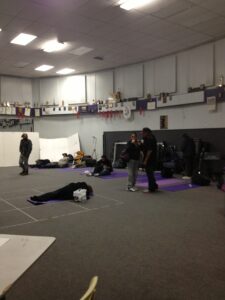
“Only a few clients though,” remembers Marianne.
Alpha House had moved all its Detox clients to our housing building, Madison Place, finding ways to accommodate a lot more individuals than the building was built for. It was a rush of coordinating staffing and scheduling, trying to figure out where people were going to go and if they could get there and, more importantly, how to get to our clients.
“We had all our vans going downtown looking for our people,” Jade explains. “They were spending the entire day collecting folks – who were coming out of all sorts of hiding places downtown.”
“We rescued about 100 clients that way”
At some point early on Friday, with Marianne organizing staff with one phone, one directory, and a lot of chaos, Jade, Kathy, and, Finance Manager Vivian, decide they need to get to Alpha House’s Shelter.
“We weren’t supposed to be going back down there. Past a certain point, downtown was blocked off. You could see Alpha House at the end of the street and we ended up getting a ride in from this massive truck that was ferrying people who were stranded on the spiral [the Victoria Park/Stampede Train Station].”

The Shelter was a mess. As staff could hardly have expected the situation Calgary was about to be in, they hadn’t taken anything on evacuation. The rescue mission Jade, Kathy, and Vivian embarked on was to pick up some essentials: cheques, gift cards, supplies, and anything that might help setup a temporary shelter.
FRIDAY. 21 JUNE 2023. 1700 HOURS. CALGARY, AB.
It was more and more apparent as Friday June 21st dragged on, that Alpha House was not supposed to be at Central Memorial High School. “We were eventually told we had to move to Village Square. Red cross had setup Village Square as yet another evacuee space,” says Marianne.
ENTER KAREN, then Team Lead at Alpha Housing Program, Francis Manor.
On the right side of the river, Karen is there to meet the buses coming from Central Memorial High School, standing alone in front of the concrete steps.
“I’m waiting there and all of a sudden, the buses are coming in and I’m looking everywhere for our people – because it wasn’t just Alpha House – Inn from the Cold and the Mustard Seed all had clients coming – so I’m trying to direct our people to the spot setup in Village Square for us.”
“They [the Red Cross] did such a good job; it was a great setup; the clients loved it”
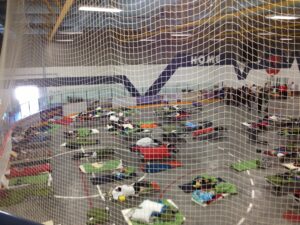
SATURDAY. 22 JUNE 2023. 0700 HOURS. VILLAGE SQUARE LEISURE CENTRE.
In what would become the start of a great deal more awareness and appreciation for Alpha House’s Outreach services, the DOAP team is out supporting Calgary Police Services with evacuations and rescues. They had rescued over a hundred of Alpha House’s clients the day before, but they were still out looking for people in the flooded downtown. And at Village Square, Karen is leading Alpha staff.
“It was pure chaos in some ways,” says Karen, “because all of these people are coming and going; there are 3 organizations with their staff and clients; police everywhere; people on the grass; community members are showing up trying to give food and clothes……. “But we didn’t have HMIS systems then.” jumps in Marianne, the database homeless-serving agencies use to track case management for clients, “so we had no way of checking people in and out and there were people everywhere.”
“Clients were going into withdrawal – because they couldn’t get downtown to get their substance of choice”
The temporary shelter at Village Square lasted one week.
SUNDAY. 23 JUNE 2023. 0700 HOURS. VILLAGE SQUARE LEISURE CENTRE.
Summer camps at Village Square kicked out the agencies using the space for temporary shelter. Canada Day long-weekend camps were starting and the centre had to be back up and running.
“We couldn’t stay there anyway,” says Karen. “Police were bringing complaints from community members because they weren’t used to seeing our clients out wandering in the community. We were dealing with a whole bunch of people who were trying to be helpful, but there were no systems in place.”
“And while we were working in the different locations, some of our staff were staying in the same evacuation shelters we had been supporting clients in,” adds Marianne.
Eventually, a committee was established to advise on what was going on in the city and to capture what supports were needed and how they could be provided. And, as part of this process, several locations are proposed during the time spent at Village Square.
But there was nothing very suitable.
There was a warehouse in Bowness – no running water and no electricity. Kathy remembers Nicole on the other end of the phone, having just toured the bare bones of a virtually empty concrete building, crying, saying, “It’s horrible; we can’t do this.”
Another possible location: the Holy Redeemer School in Forest Lawn. Not then used as a school for many years.
Karen remembers spending a long time mapping out the space – “how we were going to check clients in, what the flow was going to be, where was the staff desk going to go, where would the supplies be stored, how would clients move through the space safely.”
Within 24 hours, a petition had come from the community to prevent Alpha House from setting up at the holy redeemer school.
FRIDAY. 28 JUNE 2023. 0700 HOURS. CALGARY, AB.
“That was a panicky 24 hours,” remembers Marianne. “I got a call from CEMA saying ‘you won’t be going to the school, but you can’t stay here.’ I called Karen and just said, “We aren’t going to the school, they don’t have a place for us.”
Within that 24 hours, Alpha House toured locations, mapped out the school as a temporary shelter, mapped out and setup what would become the next destination, Max Bell Centre, and then also toured a further location because it was already known Max Bell would be yet another very temporary solution.
“That [at Max Bell] was the best week of the whole flood”
Stampede still happened in 2013, a defiant tag line ‘Come Hell or High Water,’ telling the world a little (or a lot of) water wasn’t going to stop Calgarians from coming together.
“They still did fireworks every night,” Karen reminisces, “clients and staff would go out on to the rocks [in the Max Bell parking lot] and watch the fireworks. It was the most beautiful scene.”
One particularly memorable day of that week at Max Bell, Alpha House staff brought BBQs in on the backs of pickup trucks, a staff member got free food donated from her other place of work, and, overlooking the city, Alpha House had its own Stampede event. “It was probably the best one we ever had,” says Karen.
There were still challenges – one of the larger ones, literally, was the sheer size of Max Bell, finding ways to block off areas and close off different sections, lock doors and use whatever was available to make the space manageable, safety wise, for clients and staff.
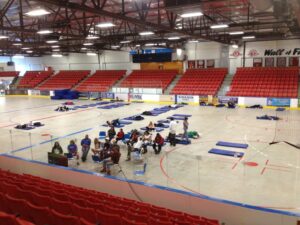
SATURDAY. 7 JULY 2023. 0700 HOURS. MAX BELL >>> CALGARY SCIENCE CENTRE
“The Science Centre location was an ongoing work in progress,” Jade shares. “It was so big, it had no showers, it was raining inside” (yes, you read that right).
“There was definitely a lot of stress in our daily meetings,” says Karen, “It was a constant question of ‘how are we going to make this work.’ The bathroom was so far away. We had to post 2 staff down the hall just to get clients down the hallway.”
“And the staff bathroom was outside,” Jade jumps in, laughing, “which was fine…except it was stainless steel….and it was late October/November.”
A trailer was used for showers for clients and there were extremely limited laundry services – courtesy of a dry cleaners in….Kensington. “There was a lot of driving back and forth,” says Karen.
But there was no shortage of creativity and staff ingenuity to keep things operating. “Once we got to the science center, we knew we were there for awhile, and we just made it work.”
“The showers worked, the bathrooms worked, Jesus Loves You gave us their kitchen to make food, and we thought this is just what we’re dealing with and we’ll deal with it.”
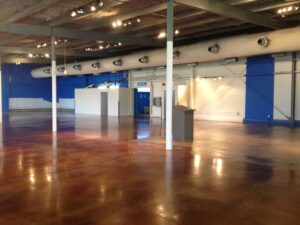
OCTOBER 2023. 0700 HOURS. CALGARY ALPHA HOUSE SOCIETY.
When you started going back into the building what was that like?
“Going back into the empty building was really creepy,” Marianne says immediately. “It was strange,” agrees Karen. “And it was sad cause it was empty, and everything was damaged and after 4 months of chaos and all the other locations, we were going to be starting over again, again”
“Definitely bittersweet,” Jade adds, “it was a lot; we went through a whole lot, it was trying for all of us”
What was the feeling among staff while you were navigating these challenges? Motivated?
“Very motivated in a lot of ways,” Karen agrees, “everyone was exhausted; everyone was working so much overtime, but we all showed up every. damn. day.”
How long till things felt a bit normal?
“Right away”, Jade says immediately, “we had our systems back; we got very good at putting a shelter together quickly.”
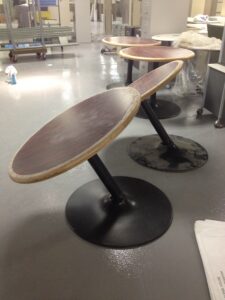
JUNE 2023. 1100 HOURS. CALGARY ALPHA HOUSE SOCIETY.
Looking back on the 2013 floods, there is a clear theme that emerges, which most of Calgary would likely agree with. The community stepped up. In so many ways. There was a significant amount of scrambling, and a lot of chaos and confusion, but there were so many helpers and no shortage of people and groups and partners who were ready to step in and support. There are a few that stand out for us:
- Our own clients making room for other vulnerable individuals, such as our Veteran’s adapting to all our Detox clients taking up residence in their building, sharing supplies and common areas
- CUPS Calgary didn’t ask anything from us and gave us free rent, office space, keys to their building; they saved our bacon as we didn’t have any long term resources and the damage to the building was substantial. They welcomed us there for 7-months and we were not a small group
- Community members – donating and volunteering and being so helpful supporting not just Alpha House but all of the groups and community members displaced by the flooding


